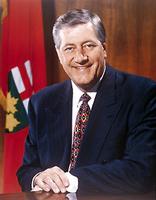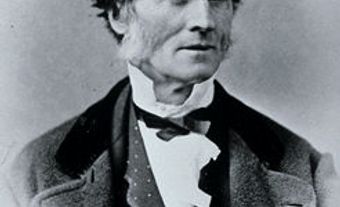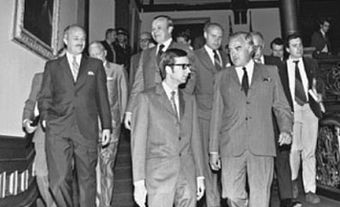This article was originally published in Maclean's Magazine on June 19, 1995

Harris, Michael Deane (Profile)
In the spacious brick split-level house high on a subdivision hill overlooking North Bay, the man who has been cast as the voice of white middle-class suburban wrath was pacing his recreation room in a pair of burgundy shorts and a mood that was even more mellow than usual. Practising his election-night victory speech, Mike Harris was trying to get his tongue around two passages in his still-tortured French when the congratulatory calls began rolling in. Even before the polls had closed, former premier Bill Davis phoned to salute his provincewide sweep, which restored the Conservatives to power at Queen's Park for the first time in 10 years. Next, Reform Leader Preston Manning and Prime Minister Jean Chrétien were on the line. Harris was just climbing into his suit when Bob Rae called to make his triumph official as Ontario's 22nd premier.
Across the room, his best friend, Peter Minogue, a North Bay real estate broker, shook his head. "It's unbelievable," Minogue said. "He'd set that goal for himself back in high school." In fact, in the 1963 Algonquin Composite School yearbook, which listed his pastimes as "bowling, curling and antagonizing," a crew-cut 17-year-old better known to his pals as "Mikey" or "Hairy Harris" had declared his ambition to become prime minister. But as Minogue pointed out: "At the time, everybody thought it was a joke."
In those days, politics seemed the unlikeliest of careers for the amiable six-footer who had never shown a moment's interest in student government or wasted much time on schoolwork. When the provincewide Grade 13 exams loomed, Harris did not even have any notes. For two weeks, he moved into Minogue's house and crammed from his friend's meticulous jottings. Not only did he pass, "he got higher marks than me," Minogue chuckled. "It just goes to show what a quick study he is."
Over the coming weeks, that talent could stand the 50-year-old Harris in good stead as he attempts to carry out his campaign vow to plant the pillars of his Common Sense Revolution, including massive personal tax cuts, in a province already reeling under the country's most crushing debt load. To many, not least among them his own 80-year-old mother, the task he now faces looks anything but enviable. Standing among the well-heeled crowd cheering his victory, Hope Harris confessed: "But I can't imagine why anybody would want this job."
A year ago, with Lyn McLeod soaring in the polls and the federal Tories in such disrepute that Harris avoided mention of the party's name, there seemed little danger that he would get it. But the university dropout who has been dismissed as a small-town golf pro had already spent the better part of his 14-year political career in the legislature defying expectations. Once scorned as a glad-handing rube by the urbane veterans of Ontario's Big Blue Machine, Harris was passed over for a cabinet seat by Davis and ridiculed at first in the 1990 provincial leadership race. "People have always underestimated Mike Harris," said Conservative campaign manager Tom Long, one of the few who did not.
An executive headhunter in Toronto, Long fingered him as the man to rebuild the shattered party. In Harris, he saw a small-town guy with a knack for networking and the common touch - no fancy airs or five-dollar words - who could replenish the Conservatives' grassroots in the land of the two-car garage and the backyard barbecue. Now, Harris finds himself hailed as a dogged visionary who has helped remake the country's political map. Cementing its definitive shift to the right, he has been compared to another affable candidate who was dismissed as an intellectual lightweight only to ride to victory on a groundswell of populist resentment: Ronald Reagan. "That's the great lesson of this campaign," said Long, adopting the Reaganaut vocabulary. "There is a silent majority out there."
Like Reagan, Harris's appeal rests on his nostalgic call for a return to a time when the province was a simpler place - one not unlike North Bay, his home town of 65,000 on the shore of Lake Nipissing, where folks still leave their houses unlocked. Stumping the province, he loved to celebrate its virtues, arguing: "There are a lot of North Bays out there, and they think like we do and share our values." Born in Toronto, Harris moved to North Bay before his first birthday and, until he was elected to the legislature in 1981, he had scarcely strayed from its rugged environs. At 12, his British grandfather took him on a sentimental journey back to England, but foreign lands held little lure. His older brother, Sid, now an investment counsellor in Orangeville, Ont., went off to university, and even his kid sister, Mary, left home for library school. But for Harris, whose boyhood buddies remain his closest friends, North Bay was world enough. Summers were spent fishing and running his paper route to cottagers along the lake, and even in winter, there were nonstop parties and sports.
Routinely described as burly today, he was small for his age as a boy, and terrified he would remain a runt. His father, Deane, who owned his own welding supply company, was a formidable figure, both gregarious and gruff, who, at 81, still towered over his son's victory party last week. "Michael was determined he was going to grow," he recalled. "So he saved up his money and sent away for an exerciser that was advertised in the comic books." Even when he did finally spurt into a gangly teen, his friends say he was never a natural athlete. Although he played junior hockey, he avoided the rough-and-tumble of high-school football for the archetypal middle-class pastimes of curling and golf.
When he was 15, his father sold his welding business and bought a nearby fishing camp called the Wasi Falls Resort, to give his family a taste of the gritty realities of entrepreneurship. "We kept books, and I made them do daily reports from the marina about how much gas they sold and how many boats went out," Deane Harris recalled. "And those books had to balance every day, so he recognized early there was an accountability." Mike Harris was in his element, guiding guests to pickerel and walleye, which he would fry up for a shore lunch, and chatting up visiting Americans with the ease of a seasoned shmoozer. Invariably, he attracted an army of kids in his wake, clamoring to hitch a ride in his truck. His father still laughs over one miffed U.S. visitor who complained that he had spent a fortune to show his boys the wilds of the Canadian North. "You can imagine how I feel," he lamented, "to find out that the highlight of the whole trip was a trip to the dump with Mike."
Years later, that same easygoing charm would convince Tom Long that Harris had the wherewithal to survive the political front lines. "Mike, more than anybody I've ever worked with, has a great centre of gravity," he said. "He doesn't have great self-esteem needs, so there aren't the highs and lows." In fact, over the gruelling six-week campaign, that blithe equanimity has occasionally mystified his wife, Janet. "He may have had a really stressful day," she marvelled. "But he turns the light off and goes to sleep. I'm lying there, tossing and turning and thinking, 'Oh, gee, I shouldn't have said that,' and all of a sudden he's snoring. He's not a worry wart."
Still, in 1965 when he went off reluctantly to Waterloo Lutheran University, now Wilfrid Laurier, to major in math and science, his parents wished he could raise his angst level. Bored and already flunking out of more than one course, he announced before the year was over that he was dropping out and coming back home - a decision that sparked a brief rift with his father. "We were disappointed," Deane Harris admitted last week. "Of course, in retrospect, I don't suppose he could have done any better than he has done." What frustrated him was that his second son, who seemed capable of mastering whatever he set his mind to, just didn't seem inclined to focus on any one thing for long.
During his acceptance speech last week, Harris sheepishly owned up to the fact that for years, he suspected, his parents worried what would become of him. But his father had just invested in a ski hill on the next-door property, and Harris knew exactly what he wanted to do: at 21, he went off to Ste-Adèle in the Laurentians to learn how to become a ski instructor. That two-year Quebec sojourn turned Harris into a crack instructor, but it had little influence on his mastery of French, in which he is still being coached. It did, however, put a brake on his bachelor days. At 22, he married Mary Coward, whom he had dated in high school, where she was known as Tweetie. But by the time they moved back home 18 months later, the marriage had unravelled.
Still, friends have no recollection of Mike Harris being depressed. Instead, he moved in with Peter and Barbara Minogue, who were newly married. Two decades later, Barbara Minogue, the registrar at Canadore College in North Bay, has graduated from taking charge of Harris's laundry to running his political campaigns. And the couple remains at the heart of Harris's inner circle, getting together on weekends that he makes it home and holidaying once a year in the Bahamas or Las Vegas, where they golf and gamble. In the '70s, they all enrolled at teachers' college and threw themselves into competitive bridge, eventually winning the Northern Ontario regional championships.
At W. J. Fricker Public School, where Harris taught Grade 7 and 8 math in a new open-concept class of 120 students, Minogue remembers him as "a bit of a rogue. When the bell went, he was out the door. But the kids just loved him, because he was not a real discipline person." Teaching fit in with summers running the fishing camp with his dad and winter weekends instructing at their Nipissing Ridge ski hill. But as the ski business boomed, Harris abandoned the classroom. Then, when a rival hill with a fancy tow lift and a government grant put a serious dent in their business, they sold out to a developer.
Through friends, Harris landed a job running the Pinewood Golf Club. Ironically, his management skills, not his nine handicap, won him the job. "He worked so hard at his golf game that he finally got it respectable," Minogue said. "But when he started, he was just an average golfer." By then, Harris had a partner to help run the club. In the summer of 1970, a mutual friend invited Janet Harrison, the secretary to a local architect, to a water-ski club on Lake Nipissing, which Harris had organized. For her, it was love at first sight. "But I had to work on him for a while," she laughed. "At the time, he had eyes for somebody else." Four years later, they were married in an unpretentious ceremony in town, with a honeymoon at Florida's Disney World.
Looking back on those years working weekends and holidays, she sees them as a tailor-made apprenticeship for Queen's Park. "Working all hours, dealing with the public," she said, "I've often said that was good training for political life." An energetic strawberry blond, she has already so captivated Harris's travelling media contingent with her guileless warmth that during his first post-election news conference, a reporter asked the premier-designate if he would be following her advice to avoid the perils of a swelled head. Harris chortled that she had already kept him in line that morning. "I've been around him enough to know when the smile gets a bit phoney," she admitted.
Within a year of their marriage, he had run for the North Bay school board, where he was later voted chairman in 1977. And Janet Harris has had two decades since to adjust to the slings and arrows of politics. But she admits she was shocked during this spring's provincial election campaign to hear her husband branded "Chainsaw Mike," an enemy of women. Not only is Barbara Minogue one of his closest collaborators, but at home he can frequently be found behind the stove, whipping up a stir-fry. For nearly 10 years, as Janet tried surgery and in vitro fertilization in a vain attempt to have children, he never flinched in his support. Then, in February, 1985, shortly after Davis's successor, Frank Miller, named Harris to his first cabinet post as minister of natural resources, Harris was flying back from a meeting in Sault Ste. Marie on his departmental jet when his cell phone rang. When he hung up, a grin was slicing his jaw in goofy disbelief. The Children's Aid Society had just called to announce that Michael Jr., now 10, would be arriving within days. "I'm going to be a father," he said as aides scrambled to find a celebratory beer.
Three years ago, another call announced the arrival of Jeffrey, a blond bundle of energy. But a year later, Harris noticed his son almost never used his left arm. It took less than five minutes for a pediatrician to diagnose a mild case of cerebral palsy, for which he now receives a regimen of gymnastics and physical therapy. "It was a real tough moment," Janet Harris said. She had seldom seen her husband weep. "He has a little trouble spilling it out," she said. "But he did when we found out about Jeffrey."
For Harris, the crucible in his own life began not dissimilarly 15 years ago - with pins and needles in his hands. Increasingly, he found himself unable to use his arms. By the time doctors diagnosed him with Guillain-Barré syndrome, a neurological disorder that attacks the nervous system, he was in a wheelchair and confined to hospital for two months. When he was released, he could barely shuffle and had to learn to walk again. For a happy-go-lucky jock, it was, his wife said, "devastating, depressing - to think you don't have control over yourself." Until then, Mike Harris had never quite found his purpose in life. Within a year of his recovery, he was running for the legislature in a seat that had been a Liberal stronghold for 20 years. "He did a lot of soul-searching," his wife said. "It sounds a bit corny, but I think he thought, 'I'm going to get better, and I'm going to make things better for other people.' "
The moment he won, his father breathed a sigh of relief. Down in Toronto, the Big Blue Machine might have underestimated the North Bay backbencher, but his friends and family swear they knew that once Mike Harris found politics, it was just a matter of time until he made it to the top. If pundits marvel at how he defied the polls to tap into grassroots discontent, they also might note that he did not have to go far to hear those rumblings. Deane Harris admits that the Reform party's message strikes a certain resonance with him. But those who know his son scoff at predictions that he will steer the province radically rightward or unleash a Darwinian regime. The Mike Harris they knew on the school board or at the country club was a conciliator, not an ideologue. As Peter Minogue recalled: "He can tell people to get lost in such a nice way they still like him."
And like the millions of other voters who bought the message of his Common Sense Revolution, they are unlikely to let Harris off the hook if he fails to deliver. After all, they are singularly unimpressed with those big-city types down in Toronto who spent most of the past year dismissing their native son as a lunkhead who could never master the complexities of an economy that is bigger than many countries' gross domestic product. "So he's going to run the province," Deane Harris shrugged. "Running the province is no different than running a pro shop. It really, really isn't all that complicated if you use common sense."
Maclean's June 19, 1995

 Share on Facebook
Share on Facebook Share on X
Share on X Share by Email
Share by Email Share on Google Classroom
Share on Google Classroom


